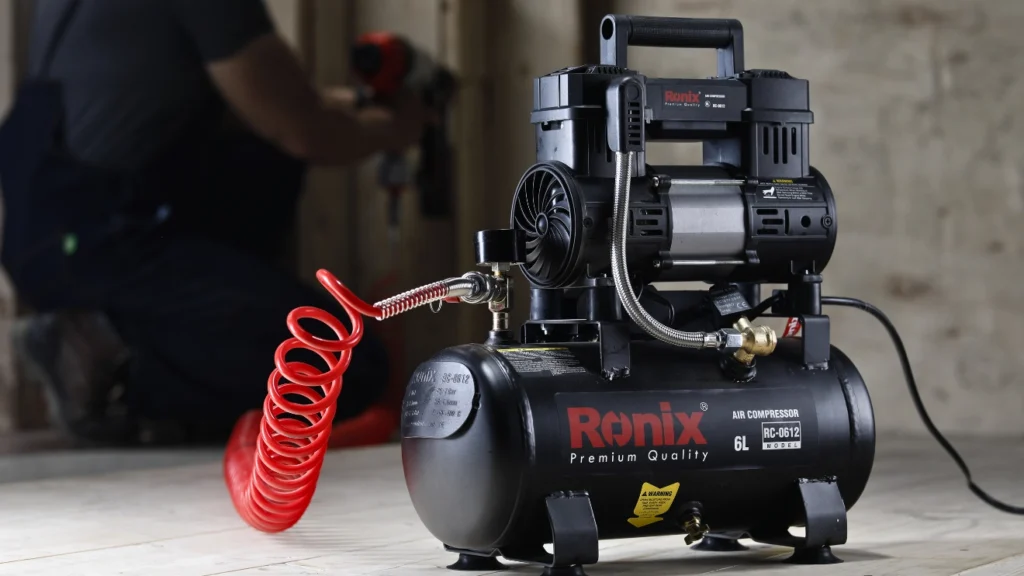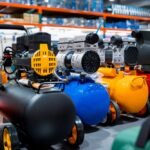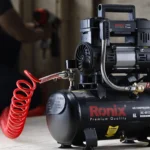An air compressor is a fundamental device that transforms power, typically from an electric motor, diesel engine, or gasoline engine, into potential energy stored in pressurized air. The basic mechanism involves drawing air into a storage tank using an engine-driven pump, where it is then compressed to a higher pressure.
When needed, the compressed air can be released in a controlled manner to perform various tasks, making it a highly versatile tool in both industrial and everyday applications.
The operation of an air compressor is straightforward yet highly effective. The machine works by reducing the volume of captured air, thereby increasing its pressure, allowing it to be stored and used as a powerful energy source. This stored energy can be rapidly released for a broad range of uses, from simple infrequent tasks like inflating tires to more demanding industrial applications such as powering pneumatic tools and machinery.
The importance of air compressors cannot be overstated, given their broad applicability across different fields. In the industrial sector, air compressors serve as essential power sources for various tools and devices, enhancing productivity and efficiency.
In the automotive industry, they are indispensable for tasks like painting vehicles and running pneumatic wrenches. Additionally, they find significant use in healthcare for operating medical equipment, in construction for jackhammers and drills, and even in home maintenance for tasks such as cleaning and home improvement projects.
The versatility of air compressors is one of their greatest strengths, providing a reliable and efficient solution for converting energy into practical, usable forms. Their ability to store energy in the form of compressed air and release it on demand makes them invaluable in countless situations, illustrating their indispensable role in modern life across numerous fields and industries.
Industrial Applications
Air compressors play a pivotal role in industrial settings due to their versatility and efficiency. In the realm of manufacturing, air compressors are indispensable for powering pneumatic tools, which are vital for tasks such as drilling, cutting, and sanding. These tools benefit from the enhanced precision and control that compressed air provides, leading to improved productivity on the assembly line and in production facilities.
Moreover, air compressors are essential in the operation of assembly lines, where they are utilized to automate and streamline processes. This automation reduces manual labor and enhances consistency, ensuring that products meet stringent quality control standards. For instance, in the automotive industry, air compressors are used extensively for tasks ranging from inflating tires to operating robotics systems that assemble car parts.
The application of air compressors extends to paint spraying as well. In industries like automotive and furniture manufacturing, achieving a smooth and even coat of paint is crucial. Air compressors provide the necessary force to atomize paint particles, ensuring a fine and uniform application. This is not only efficient but also environmentally friendly, as it minimizes the overspray and waste often associated with traditional painting methods.
Furthermore, air compressors are crucial in providing clean air for various applications. For example, in the food and beverage industry, maintaining a contaminant-free environment is critical. Compressed air is used to clean equipment, package products, and move ingredients without risking contamination.
Similarly, in the pharmaceutical sector, air compressors ensure that products are manufactured in a strictly controlled atmosphere, safeguarding the integrity and safety of medications.
A notable case study highlighting the importance of air compressors is in the aviation industry. Aircraft manufacturing and maintenance rely heavily on compressed air for a myriad of tasks, from powering tools to operating equipment that ensure precision and safety in operations. All these applications underscore the fundamental role air compressors play in modern industrial processes, making them an integral component across various sectors.
Construction and Building
In the construction industry, air compressors play a pivotal role, fundamentally shaping how various tasks are performed. By converting power into potential energy stored in pressurized air, these devices provide a versatile energy source that powers a multitude of construction tools and equipment. This capability ensures that air compressors are indispensable to construction professionals, enhancing both efficiency and productivity on site.
One of the most prominent uses of an air compressor in construction is its ability to power jackhammers. These robust tools rely on compressed air to deliver high-impact blows, making the process of breaking up concrete and pavement not only faster but also far more effective.
Similarly, the adoption of air compressors for sandblasting tasks facilitates the efficient removal of paint, rust, and other surface contaminants from buildings and structures, ensuring surfaces are adequately prepared for refinishing.
Air compressors are also extensively used to operate nail guns. Unlike traditional hammers, pneumatic nail guns, powered by a portable air compressor, can drive nails with precision and speed, thereby significantly expediting framing, roofing, and other carpentry tasks. This not only improves the accuracy of the work but also minimizes worker fatigue, enhancing overall productivity.
Another critical application of air compressors in the construction field is within painting and finishing tasks. Spray painters powered by compressed air provide an even and consistent coat of paint, which is difficult to achieve with conventional brushes and rollers. This is particularly important in large-scale projects where time efficiency and quality finishes are paramount.
The use of air compressors on construction sites extends beyond just powering tools. They also serve in maintaining sufficient air supply for various other applications, ensuring seamless operations. The versatility and efficiency offered by air compressors make them a cornerstone of modern construction practices, underscoring their indispensable role in elevating operational standards across the industry.
Home Improvement and DIY Projects
Homeowners and DIY enthusiasts frequently appreciate the utility and versatility of air compressors. These devices have become essential for a myriad of tasks, simplifying and enhancing various home improvement and maintenance activities. For instance, carpentry projects can significantly benefit from air compressors.
Pneumatic tools such as nail guns and staplers powered by an air compressor make fastening wood and other materials both quicker and more efficient, ensuring precision and reducing fatigue compared to manual methods.
Beyond carpentry, air compressors are invaluable when it comes to inflating items around the home. Whether it’s car tires, bicycle tires, or sports equipment, an air compressor makes inflating these items incredibly easy and time-efficient. No longer do individuals need to struggle with hand pumps or make trips to the gas station for tire inflation, as a reliable air compressor readily accomplishes these tasks at home.
Another common use of air compressors in the domestic setting is for cleaning purposes. The power of compressed air is excellent for blowing away dust and debris from hard-to-reach areas such as computer components, workbenches, and even the interiors of cars. This method not only ensures thorough cleaning but also saves time and effort in maintaining cleanliness.
Additionally, air compressors are highly advantageous for painting projects. Spray painting with an air compressor yields a smooth and professional finish, whether one is repainting furniture, walls, or other surfaces. The controlled, even spray provided by pneumatic paint sprayers translates to superior coverage and a more durable paint job compared to using traditional brushes or rollers.
Lastly, air compressors assist in various other maintenance tasks, such as operating pneumatic wrenches and drills, which are beneficial for both minor repairs and more substantial renovation activities. The multipurpose nature of air compressors showcases their essential role in elevating home improvement endeavors, making them a favorite tool among DIY enthusiasts.
Automotive Industry
Air compressors hold a pivotal position in the automotive industry, catering to a diverse range of applications that augment both repair and manufacturing processes. The versatility and efficiency of air compressors make them indispensable tools in auto shops and production lines. One primary application is the operation of pneumatic tools.
These tools, powered by compressed air, are essential for tasks such as tightening or loosening bolts, drilling, sanding, and grinding. Their reliability and power make them superior to electric alternatives, significantly speeding up repair and maintenance tasks.
Painting and finishing vehicles is another critical use of air compressors in the automotive sector. High-pressure air ensures a consistent spray pattern that results in a smooth, even coat of paint. This method not only enhances the aesthetic appeal of vehicles but also extends their lifespan by providing a durable finish.
Additionally, compressed air is used in detailing tasks, cleaning out hard-to-reach spots and ensuring a pristine vehicle presentation.
Tire inflation is yet another crucial application. Maintaining proper tire pressure is essential for vehicle safety and performance. Air compressors make it easy to inflate tires to the recommended levels, ensuring optimal driving conditions and fuel efficiency.
Moreover, auto shops frequently employ air compressors in running air conditioning systems. During servicing, these systems must be cleaned, recharged, or tested; compressed air proves instrumental in ensuring these tasks are performed accurately and efficiently.
In the realm of production lines, air compressors facilitate automation and precision. They are integral to the functioning of robotic arms and assembly machines, contributing to the seamless manufacturing of vehicle components. This not only speeds up production but also enhances the quality and consistency of auto parts, ultimately benefiting both manufacturers and consumers.
In essence, air compressors drive a multitude of critical functions in the automotive industry, underscoring their importance in ensuring operational efficiency, safety, and high-quality vehicle maintenance and production.

Agricultural Uses
In the realm of agriculture, air compressors play a pivotal role in enhancing productivity and efficiency. These versatile machines are instrumental in a range of applications, from powering heavy-duty machinery to facilitating routine maintenance tasks.
One notable use is in air-powered tractors, which leverage the power generated by air compressors to operate various mechanical systems. This innovation not only reduces reliance on traditional fuel sources but also contributes to more sustainable farming practices.
Furthermore, air compressors are essential in the operation of irrigation systems. By providing the necessary pressure to distribute water evenly across fields, these compressors ensure that crops receive adequate hydration, thereby improving yield quality and quantity. This precise control over irrigation translates to more efficient water use, which is increasingly important in managing agricultural resources responsibly.
In addition to these critical functions, air compressors are invaluable in maintaining farm equipment. Cleaning farm machinery, for instance, is significantly more efficient with the use of compressed air. The force generated can effectively remove dirt, debris, and other contaminants that accumulate over time, ensuring the longevity and optimal performance of the equipment.
This routine maintenance task becomes less labor-intensive and more thorough, ultimately saving time and reducing the risk of mechanical failures.
Moreover, various machinery tasks within a farm setting, such as operating pneumatic tools for repairs or setting up greenhouses, also benefit from the use of air compressors. These compressors provide consistent and reliable power, enabling farmers to undertake complex tasks with greater ease and precision.
It is evident that incorporating air compressors into agricultural operations leads to enhanced efficiency and productivity, underscoring their significance in modern farming.
Healthcare and Medical Industry
In the healthcare and medical industry, the utilization of air compressors is indispensable for various critical functions. These devices are pivotal in powering ventilators and other life-supporting respiratory equipment. Medical professionals rely heavily on the consistent and precise operation of air compressors to ensure that patients receive the optimal flow of clean, pressurized air necessary for life-sustaining treatment.
Moreover, air compressors play an essential role in dental care settings. They are used to operate a wide array of dental tools including drills, air abrasion systems, and other instruments. The functionality extends beyond mere operational competence; the air provided must be free from contaminants, ensuring patient safety and maintaining the hygiene standards critical in dental treatments.
The management of medical gas systems is another significant application of air compressors within the healthcare sector. These systems often involve the distribution of various medical gases such as oxygen, nitrogen, and nitrous oxide throughout hospital facilities. Air compressors ensure that these gases are transported at stable and appropriate pressures, ensuring they are readily available for urgent patient care needs.
Reliability and precision are of paramount importance in the medical applications of air compressors. Any malfunction or deviation in pressure can lead to severe consequences, impacting patient health and treatment outcomes.
Therefore, regular maintenance, adherence to stringent safety standards, and the use of high-quality equipment are non-negotiable requirements for air compressors used in medical environments. These measures ensure that healthcare providers can depend on the consistent and accurate performance of air compressors, ultimately aiming to enhance patient safety and treatment efficacy.
Maintenance, Safety, and Best Practices
Proper maintenance and adherence to safety guidelines are critical for ensuring the longevity and efficient operation of air compressors. Consistent upkeep not only helps in optimizing performance but also plays a vital role in safeguarding users from potential hazards.
First and foremost, regular inspections are paramount. Users should routinely check the air compressor for any signs of wear and tear, including leaks, unusual noises, or overheating. Ensuring that all components, such as hoses, connectors, and seals, are intact is essential. Additionally, it is crucial to monitor the oil level and change it periodically if your air compressor model requires lubrication.
Proper usage cannot be overstated. Always operate the air compressor within the manufacturer’s specified pressure levels to prevent undue stress on the system. Avoid exposing the compressor to harsh environments, such as extremely high temperatures or moisture-laden settings, to prevent damage and corrosion. Ensuring clean intake air can also prolong the life of the compressor by preventing particulate matter from entering the system.
Troubleshooting common issues can save time and avoid costly repairs. For example, if the air compressor does not start, users should check for electrical issues, such as a blown fuse or tripped circuit breaker. If the compressor is not building pressure adequately, it could indicate a problem with the pressure switch or a leak in the hose. Addressing these issues promptly can prevent further complications.
Adhering to safety standards is non-negotiable. Always wear appropriate personal protective equipment, such as safety goggles and ear protection, when operating the air compressor. Ensure the work area is clean and free of tripping hazards. It is also advisable to have a well-ventilated space to mitigate the risk of harmful emissions or explosions in case of a malfunction.
Ultimately, a well-maintained air compressor, coupled with safe operational practices, ensures not only the efficiency and longevity of the equipment but also the safety of the user. By following these guidelines, both novice and experienced users can effectively manage their air compressors, thereby maximizing their utility across various applications.










